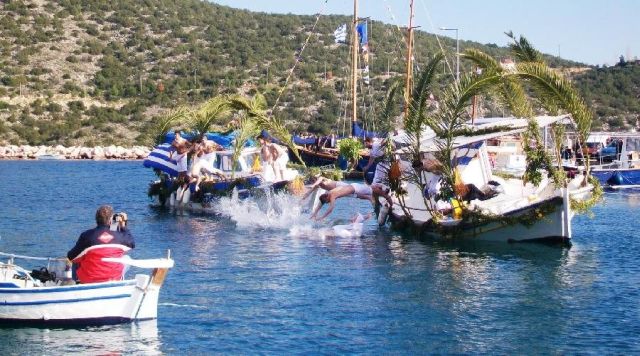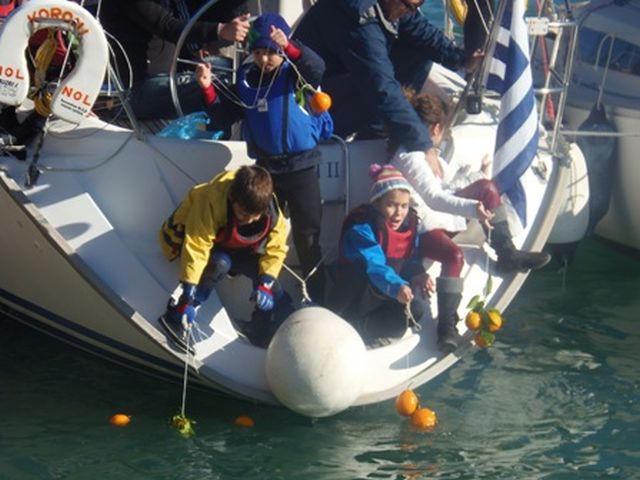Customs and traditions whose roots lie far in the ages will come to life again this year on 6 January, during the celebrations of Epiphany in different parts of Greece.
Religious anxiety mixes with the celebrations of Epiphany, when according to popular beliefs bugbear and ghouls leave. The festive days mark the cult of water too. The fears of darkness and evil winter spirits disappear. The triunity of God, the Holy Trinity, manifested itself during Epiphany. In early Christianity, the followers of the new religion were baptized during Epiphany. The countdown for all the evil spirits begins on this day. On 5 January, on the eve of Epiphany, they abandon the earthly mischief that they started at Christmas and return to their eternal preoccupation, namely to cut down the tree of life so that it collapses and disappears, thus taking revenge on the people.
The celebration of Epiphany is extremely interesting in Drama, eastern Macedonia. The purpose of all rituals is to ensure a good year, with health and prosperity for farmers and stockbreeders. Black fur caps, animal skins, masks, bells and noise, ash and people, and wandering from house to house singing about, and foretelling, health, depicting ploughing and sowing, rich tables and wishes seek to influence the fertility of nature.
Four kilometres away from Drama is Monastiraki, where the "Arapides" ritual is performed
on 6 January every year.

It is rooted in the Dionysian rites and was influenced by Christianity. "Arapides" is a traditional custom with a strong presence of exaggeration, magic and cult. It involves local residents and is one of the holidays in the period between Christmas and Epiphany in Drama, in particular in Monastiraki, Volakas, Petrous, Xiropotamos, Pyrgi, Kali Vrisi and in Nikisiani, Kavala.
In Nea Karvali, east of Kavala, the "Sagias" ritual is performed every year on the eve of Epiphany, which is observed across Cappadocia. The ritual involves round dances and songs around burning fires.

One of the most famous rituals during Epiphany, the so-called "Rangoutsaria", is performed each year in Kastoria, where the residents put on masks to chase away evil spirits. They wear masks and go around the streets, making an incredible noise with rattles and bells. At the same time, they want passersby to give them something to chase away evil.
In Paleocastro, Halkidiki, people observe the "Fotarades" custom in which a group of men choose their "king" and all go to the village church. There he bows three times before the icon of St. Athanasius, asking for his blessing. Then all "Fotarades" dance round dances in the village square around a wooden rod with a sausage tied on it. They are dressed in local costumes, holding large wooden swords.
Again in Halkidiki, in Galatista, people decorate a scarecrow in the form of a camel. Six men hide beneath it, singing to the sounds of bells. The so-called "Tzamalari" walk before the "camel". The ritual ends on 7 January with an imaginary wedding in which only men perform all the roles.

The "Yala-yala" custom has been respected in Ermioni, Argolis Region, for more than 50 years. Similar customs are typical of many fishing villages nearby, such as Porto Cheli and Kilada.
Early in the morning of Epiphany the boys who will join the army in the New Year gather, eat all together and then go round all the houses in the area, dressed in traditional sailor's uniforms and sing. On the eve of Epiphany, the residents decorate their boats with palm leaves, orange tree leaves and myrtle branches, and tie their boats at the pier before the traditional diving for the cross.
In Lefkada, people respect the "custom with oranges." Believers throw oranges into the sea, which are tied together with a rope. Then they take them to their houses for prosperity and leave one of them before the icons in the home throughout the year. Before diving for the cross, they throw into the sea the old oranges.

On other islands, such as Lesbos, when men jump into the water to catch the cross, women take water from 40 waves with a gourd. Then, at home, they soak a cotton ball in the water and clean the icons in the house, not speaking while performing the ritual. Finally, they pour out the water where nobody "sets foot" (i.e. where the holy water is thrown after a baptism in a church).